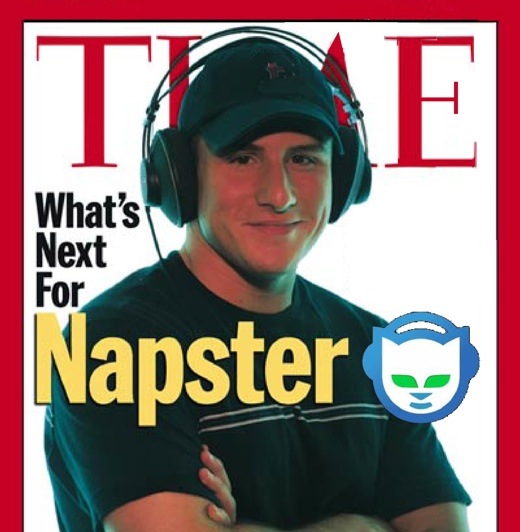 Image above: Shawn Fanning at 19, on the cover of Time Magazine at the height of Napster fame in 2000. From (http://www.geek.com/articles/gadgets/limewire-napster-the-pirate-bay-a-brief-history-of-file-sharing-20101027/).
Although new services like Spotify and Rdio offer users the ability to legally listen to vast collections of music at no cost, Napster's founders lament that music sharing today is still behind 1999.
So despite the success of Spotify and its competitors, music sharing still hasn't caught up to what Napster offered back then before being neutered by the courts, that service's founders, Sean Parker and Shawn Fanning, said today.
Image above: Shawn Fanning at 19, on the cover of Time Magazine at the height of Napster fame in 2000. From (http://www.geek.com/articles/gadgets/limewire-napster-the-pirate-bay-a-brief-history-of-file-sharing-20101027/).
Although new services like Spotify and Rdio offer users the ability to legally listen to vast collections of music at no cost, Napster's founders lament that music sharing today is still behind 1999.
So despite the success of Spotify and its competitors, music sharing still hasn't caught up to what Napster offered back then before being neutered by the courts, that service's founders, Sean Parker and Shawn Fanning, said today. During a on-stage discussion at South by Southwest here, Parker and Fanning argued that though new technologies and licensing models finally allow music lovers to legally access and discover vast collections of songs online, even the best new services are still philosophically behind what Napster originally offered its users.
Parker, who appeared earlier this week alongside former U.S. vice president Al Gore to promote political activism online, is one of technology's most prolific entrepreneurs. After co-founding Napster, he went on to co-found Plaxo, become Facebook's founding president, and then invested in and ultimately joined the board of Spotify. Now, he and Fanning, who also helped found Snocap, Rapture, and most recently Path, have a new stealthy startup, called Airtime.
Unfortunately, SXSW attendees who showed up hoping to hear more about Airtime were left disappointed as the two barely mentioned their venture.
But Parker and Fanning, who were interviewed at SXSW by documentarian and VH1 writer Alex Winter, seemed nostalgic for the groundbreaking work they did as teenagers on Napster before lawsuits and a court decision grounded the company.
Both Parker and Fanning lamented key features of the original Napster--including direct community chatting and access to unfettered collections of very diverse music--that for the most part are still missing from even the best sharing services today, including Parker's own Spotify.
And they also suggested that unless and until someone, Spotify or others that come along, is able to legally provide all the tools Napster once offered, users may still turn to illegal sources for the music they want.
"I used to say the bar was set by Napster in 1999," Parker said, "so if you wanted to make money...you not only had to meet that bar, but exceed it. Or [users] would go the piracy route."
Although Parker is an unabashed promoter of Spotify, he did acknowledge that the service--which has caught fire in the U.S. and abroad by giving users free, legal access to millions of songs--has yet to come up with a fully satisfactory way to integrate real-time chat between users.
That's a crucial feature, he suggested, because it allows music lovers to openly talk about what they're listening to and help each other discover new tunes. "We had it in Napster in 1999."
Parker also noted that even with Spotify, users "don't really have a sense of what people are listening to...You can't see people browsing collections in the same way [as Napster]."
But he did say that Spotify is developing some similar tools, and that users in some countries have access to more joint listening features. But for now, the service is still behind Napster.
For his part, Fanning recalled how Napster allowed its early adopters to access just about any kind of music--whether studio-recorded, live, or strange, rare mixes--and said that nothing today offers the "variety and depth [and] remarkable diversity" of Napster.
It's frustrating," Parker said. "We'd figured so much of this out in 1998 and 1999, but the industry wasn't ready."
Of course, a big part of the limits on today's music-sharing services comes from the licensing issues that arose in the late '90s and in the years immediately after. And even at Napster, the two said, the company's development was hampered by the legal issues that cropped up as soon as the record labels figured out what was happening to them.
"Suddenly the company was taken over by lawyers," Parker said of Napster. "Our CEO was an attorney. The lesson learned is, your CEO should never be an attorney. It became a law firm...at one point, a [large] percentage of the employees were attorneys. The legal case was dictating the product, not the other way around."
Based on that lesson, Parker said, he's helped to make sure that his new companies don't suffer the same development-stifling fate.
"At Spotify, we didn't let that happen," Parker said. "We required that the product dictate the licensing terms. That's what allows [massive adoption] and integration with Facebook."
.
No comments :
Post a Comment